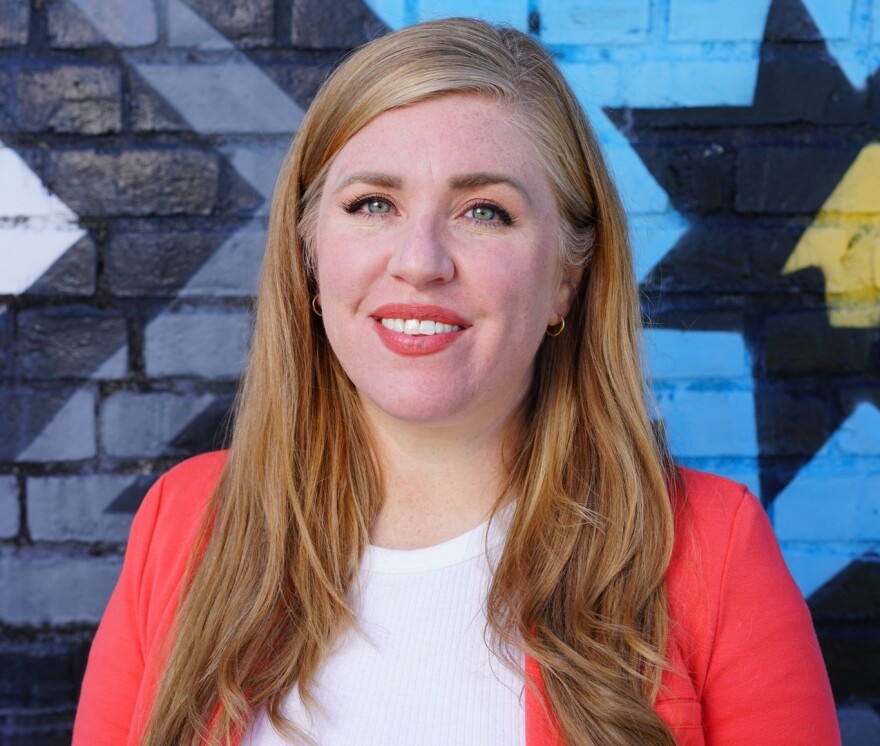New Metro Council member Jennifer Chappell says she’s ready to take her advocacy for improving Louisville’s neighborhoods to the big stage.
Chappell, a Democrat, was elected in November to represent District 15, which includes parts of the Schnitzelburg, Hazelwood and Iroquois Park neighborhoods. She was officially sworn in as a member of Louisville’s 26-seat legislative body earlier this week. Chappell is the outgoing president of the Schnitzelburg Area Community Council and former board chair of the Jefferson County Soil and Water Conservation District.
Chappell, 36, said she’s had the drive to serve the public for the past decade.
“I’m really excited just to get in [to Metro Council] and do things and do things on a neighborhood level, engaging with neighbors, empowering them and then making sure that we are building really responsible and progressive neighborhoods,” she said.
Chappell said she knows from personal experience that navigating city government and its various processes can sometimes be confusing.
In 2014, she started a project called Three Points Louisville with the goal of beautifying the area where the Shelby Park, Schnitzelburg and German-Paristown neighborhoods intersect.
Three Points Louisville managed to transform the intersection of Goss Avenue and Logan Street with public art, a community bulletin board and repaved sidewalks. But Chappell said she found little support at the start of the project.
“Nobody was really there to tell me, ‘This is how you do this, this is how you get a mural, how you fund it. This is what a maintenance contract looks like. This is what a property owner agreement looks like,’” she said.
Chappell said she wants to help other community advocates in her district navigate t city processes in order to streamline neighborhood improvements, like pedestrian infrastructure, greening and public art.
“If you want to get something done, here’s your pathway,” she said. “I really want to be the person who’s able to communicate those, so we can get things done.”
LPM’s Roberto Roldan recently sat down with Chappell as she was preparing to take office to discuss what she wants to accomplish as a Metro Council member. An excerpt of that interview, edited for brevity and clarity, is below.
Can you tell me a little bit about yourself and how that set you up to run for Metro Council?
It's been my dream to be on Metro Council. I've always been a public servant. And I really, really want to be someone that makes change in my community and change that I can see. I think policy is super important and I'm excited to influence that. I’ve got a lot of experience from being a public servant. And I say that as the current but soon-to-be former president of the Schnitzelburg Area Community Council, as well as the chair for the Jefferson County Soil and Water Conservation District. And then I'm also on the board of Center for Neighborhoods.
You obviously have quite a lot of knowledge about the Schnitzelburg neighborhood, but the district that you represent is really diverse. It snakes from the Schnitzelburg-area through neighborhoods around Churchill Downs and into Iroquois Park. How do you plan to get a handle on all of the different issues and needs of the various residents in your district?
You know, that was very apparent when I was door-knocking. There was a north side and south side, because the district does kind of wear a little belt at Central Avenue where it's only two blocks uniting the district. So, it was really important for me as somebody from that “north side” to make sure that I was going to the south side, and I was hearing them and understanding that I was going to represent them to the best of my abilities. I would be really cautious if my Metro Council person was all the way from Iroquois Park. I would say, ‘Do they even care about us over here in Schnitzelburg?’ I don't want people to doubt me, but I completely understand that they do. And I hope to prove them wrong one day.
During your campaign, you spoke about the need for improvements, not just to the bus system, but pedestrian infrastructure for people who are biking and walking. Traffic-calming measures and new bike lanes have generated some pushback in some of the historic neighborhoods that are close to your district. How do you overcome that opposition to different modes of transit?
I'm really excited to push things forward with [Mayor Craig Greenberg’s] administration. But in terms of mobility, I think that we also have to have a good plan for maintenance and upkeep, funding streams. A great example of a program that just kind of went awry was the sharrows. Something very basic: We're going to put a marking on the street to say that this is a good pathway for a bicyclist. A lot of the sharrows got paved over. They didn't get repainted if they faded. The program just kind of went by the wayside. So, even in that very basic way, however you are getting around the city, I want to make sure that you're doing it efficiently, so it's not taking you an hour to get two miles down the street but you're also able to access information on how to use different modes of transportation and also how you can connect to those.
In some of your campaign literature, you also talked about the wealth gap between the wealthy and the poor and the need to provide help to working families. It's a big issue, right? But where do you think local government can pitch in to address inequality?
We can't do anything to enforce a minimum wage, really, beyond Louisville Metro. But I do think that supporting families is really important, making sure that we're investing in our children, making sure that they have access to things that will help them prosper into the future. I think that by doing that we're going to remedy a lot of the systemic issues that we find ourselves in today. But, you know, while we're looking at how do we usher in the next generation, we still have the problems that exist today. And so we really have to figure out how we're going to be able to make investments in that next generation while also solving the problems at hand.






